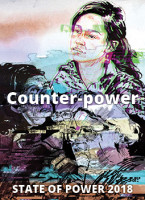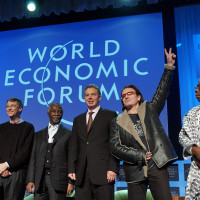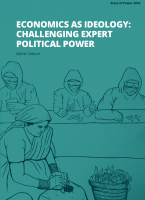Davos discourse drives cultural hegemony The elite’s real motivations are embedded in the language of globalization

Cultural hegemony, a construct developed by the Italian philosopher Antonio Gramsci, is the process by which an elite dominates society through manipulating culture. To do so, they portray their worldview as inherently beneficial to everyone, even as it functions as a socio-cultural product to advantage that same ruling class. Today, the cultural conception of globalization serves as the horizon of meaning (weltanschauung) for orientating social action, and the contemporary ruling class is perhaps best embodied by the kind of elites poised to attend this week’s World Economic Forum (WEF) in Davos, Switzerland — the so-called Davos elite.
Empirical research and theoretical elaboration in the field of social sciences — starting from the Mead and Cooley’s theory of symbolic interactionism (in the 30’s), to the Berger and Luckmann’s social constructivism and of Moscovici’s social representations (in 60’s and 70’s), up to the Matte Blanco’s Bi-logic theory of mind (in the 70’s) and the Carli’s theory of collusion (in the 80’s and 90’s) — indicates that social behaviour is driven by socially shaped and shared meanings of the subjective experience of reality. This perspective is useful for investigating the cultural factors underlying the Davos elite’s political and economic action. The aim is to better understand the processes — as well as the cultural determinants — which have created our contemporary economic, political, cultural and environmental crises. To fully grasp the political and economic actions of the Davos elite, it is necessary to pick apart their discourse on globalization. We can do so, in part, by looking at the language used by the WEF’s Board of Trustees.
Text Emotional Analysis, as developed by Carli and Paniccia is particularly appropriate as a means for determining the reciprocal affective symbolization of a given context by the people who participate in it. This method of discourse analysis seeks the latent meaning of text by deconstructing its narrative sense, focusing analysis on interactions between certain dense words (grouped into specific clusters through statistical techniques of multivariate analysis) and then using specific psychological models of social relationships developed within this theoretical model. Dense words are those words that convey emotional meaning by themselves, independently from the narrative sense of the text. In this case they are words like: growth, hope, big, freedom, crisis, limit, fall, advantage, need, threat and lower.
The examined corpus of texts is composed of speeches, articles, interviews and statements of the WEF’s board members around the issue of globalization gathered through keywords research on the internet. In examining these words, we gain insight into the root problems of the current individualistic neoliberal and globalist paradigm. Only then, may we identify strategies for intervention that enhance democracy, generate socio-economic justice, increase quality of life and facilitate a move from a system of belonging to a system of coexistence in the global ecosystem. This concept of social coexistence is based on Carli’s theory which is based on relationships between systems of belonging and strangers, mediated by rules of the game. In this perspective, systems of belonging represent a social system that functions in a self-referential and conservative way and, thus, configures the other’s diversity as a threat to immutable reproduction. In other words, the stranger represents the unknown diversity of the other as compared to oneself and this other is perceived as a threat to stability. A preferable model would see rules of the game facilitate the transformation of systems of belonging, which exclude differences by searching for and building of similarities, into systems of coexistence, which allow differences to coexist and conceives them as possible resources for common development.
Representations of globalizationThe Davos elite’s image of globalization is comprised of four cultural dimensions corresponding to clusters of dense words obtained through statistical analysis. The main dense words for each of these clusters are the following:
Cluster 1: people, believe, world, grow, impact, young people, engineer, think, history, ready, life, power, accelerate, successful, population, transform, perspective, industry, bring, imagine, convergence, cut, threat, explain, give up, honour, speak, promise, group, right.
Cluster 2: hope, big, price, stress, European countries, pay, inflation, lower, drop, high, growth, strong, reform, AfDB (African Development Bank), push, value, achieve, Greece, good, expect, fall, trade, IMF (International Monetary Fund), minimum level, shock, Africa, service, Human Genome Project, protect, policy, interest, GDP, economy.
Cluster 3: project, strengthen, invest, budget, fund, manage, provide, need, advantage, competition, tax, fail, boost, cope, employee, prepare, forecast, freedom, rule, know, crisis, solve, best, woman, raise, access, reform.
Cluster 4: IDB (InterAmerican Development Bank), member countries, sure, respect, IDB Group (InterAmerican Development Bank Group), establish, make decisions, impact-investors, Latin America & Caribbean, decision, understand, benefit, know, promote, tool, making money, Region, allow, have to, implement, investor, finance, impact-investing, provide, project, strengthen, seek, vis à vis, CEO, adopt, approve, full, crisis, ensure
On the basis of etymological and emotional analysis of these words, four cultural dimensions of the Davos elite’s image of globalization emerge and are characterized as follows:
The first cultural dimension refers to the conceptual system of beliefs which orientate life in the globalization age for the Davos elite, as a premise for maintaining power, on the basis of the following elements:
- a negative representation of the other, conceived as a featureless anonymous mass of persons acting on emotion rather than rationality;
- the proposition of three main symbolic frames for the attribution of meaning to life experiences in the globalization age;
- a form of thought based on a technocratic approach oriented to impact people’s life (especially that of young people) and thus propose models of life based on readiness, success and power and the consequent transformation of their perception of reality;
- the promotion of a pensée unique through the rhetoric of promises and honour (as respect for the constituted order) aimed at regrouping or maintaining similarities, and eliminating divergent positions which could threaten the status quo;
- the definition of this way of proceeding as a dogmatic value to respect.
The second cultural dimension is focused on manipulating and organizing social systems on the basis of the following elements:
- the construction of a messianic expectation in an attempt to generate a passive and dependent approach to the dimension of bigness;
- the proposition, as inevitable and necessary, of the negative consequences of the international financial institutions messianic intervention represented as the risk of failing in the pursuit of an ideal of development based on growth and strength expressed through the threat of inflation and the imposition of living conditions that threaten survival;
- the predominance of economic factors in determining public policies, under the dogma of free market and personal gain.
The third cultural dimension revolves around the idea of competition as the driver of social life, represented by the following elements:
- the pursuit of the strengthening of the ability to provide, invest and manage budget and funds;
- a warped view of competition based on the search for conditions of privilege to successfully compete, that is strictly linked to the negative perception of taxes, which are seen as an authoritarian imposition;
- the consequent need of developing a social order based on the idea of freedom, conceived as absence of restraint on one’s expansion;
- the importance of cognitive tools like perceiving, distinguishing, choosing and establishing in the pursuit of this ideal of success;
- the increasingly relevant role of women in facilitating the access to the needed reforms to pursue this end.
The fourth cultural dimension is based on the preeminent role of finance in the organization of human life, articulated in the following elements:
- the role of supranational finance institutions as a means for providing psychological assurance, in the form of development aid, in exchange of the gradual expropriation of the local political and economic power;
- the role of finance as the model by which to organise life and the main strategy to solve contemporary socio-economic and environmental problems, on the basis of the role of money in creating a relational model that transforms the other into a dependent debtor, with ever less decisional power;
- the effects of innovative financing schemes, such as impact investment, which, despite aiming for social benefit (alongside financial returns), actually take possession of the last remaining fields of public intervention — welfare, health care, education and energy;
- the need for integrating development assistance recipients into the myth of making money in their regions, in order to make of these regions a source of economic value;
- the tendency to interface solely with the business elite of these countries as a way to protect the elite system from the effects of possible crisis.
The main feature linking these cultural dimensions is the absence of democracy in decision-making processes. This manifests itself at both relational and organisational levels. At a relational level, specific patterns of emotional and motivational dynamics drive social interaction. The emotional pattern is identified through the Carli and Paniccia’s model of neo-emotions, which notes two possible forms of social interaction: one orientated on creative and productive exchange with the other, and another aimed at possessing the other. The former eases the development of the systems of coexistence, while the other creates obstacles to the development of the systems of coexistence.
The emotional pattern arising from this analysis is characterized by:
- the imposition of a specific dogmatic vision of reality based on a negative connotation of the elite’s counterpart (a purportedly unreliable and emotionally driven mass) and on the role of concepts like global, growth, technology, believe, power, acceleration, big, success, honour, respect, rightness, hope, strength, finance, investment, competition, freedom, deregulation and crisis in shaping life and driving human action;
- the provocation expressed by this claim is to emphasize the risk posed by any potential pensée unique, leading to a loss of local political and economic power because of international financial institutions’ intervention, the predominance of finance in the management of socio-economic and political issues and ever more deregulated economic competition;
- control of the obligations emanating from this kind of organisation with conditioned choices, while limiting the emergence of alternative visions for development, while muting socio-economic and political problem-solving approaches that present alternatives to dominant financially driven methods;
- worries and complaints against rules perceived as constraints to the elite’s desired expansion of power.
These emotional dynamics reveal an approach to social relations orientated on possessing the other rather than creating productive and creative exchange. This can be read as an expression of the fear towards the other and the unpredictability its diversity represents, not to mention a means of avoiding greater interaction with the other on the basis of reciprocal needs and expectations. This relational orientation to possess the other often comes by representing the other as an enemy, which can lead to attempts to transform it into a well-known friend assimilated to one’s own categories. This, however, inevitably requires denying differences and thus missing out on the opportunities these differences offer.
The motivational pattern is detected via McClelland’s human motivation theory. It is based on three motivational factors to social relations: the needs for power, affiliation and achievement. The need for power tends to dominate, and itself has three dimensions: a hierarchical pattern counterposing elites and people; a polar dynamic of belonging to/exclusion from the system of power based on dependency of the other; and a manipulative dynamic contraposing appearance and reality, as evidenced by the contrast between the positive image of development assistance policies and the expropriation of local political and economic powers produced by its exclusively financial logic.
At the organisational level, the dearth of democracy reveals itself in a dogmatic a priori conception of the supranational financial institutions system, which appears as immutable and not inclined to change and improvement. The foundation myth of this system is rooted in the Bretton Woods agreement of 1944, which defined the monetary and financial basis for international trade liberalization and became one of the few points of consensus in the system of global social coexistence after World War II.
The functioning of these supranational organisations is based on the following elements:
- the social mandate provided by the respect of socially grounded systems of values compliant with their ends, a sort of social obligation to turn to them to face development and public debt problems based on the general belief that this is the natural and right way to do things, and the only rational way to act;
- the assumption of compliance to their self-referentially defined rules of service delivery, separated from the specific needs of their beneficiaries;
- the substitutive function of their interventions, based on a technocratic spirit whereby experts substitute themselves for the users of their services, expropriating them of political and economic decision making power;
- the transformation of their beneficiaries from autonomous subjects, with specific needs, desires and goals, to passive and dependent users of their own self-referential procedures.
In this way these organisations operate without a real demand of services from their beneficiaries. They are not held accountable for addressing needs, expectations and goals nor for the efficacy of the services they provide.
What to do about it?Given the above analysis, several strategies for intervention are possible. Their implementation, however, requires the active and accountable involvement of those not presently part of the global elite. The main goal at a relational level concerns the implementation of new rules of the game for social coexistence that are allowed to contain manifestations of enemy-ness within relationships between belonging systems and strangers. An example of this might be, for instance, boosting institutionally funded and self-funded projects, as well as media production aimed at creating a new social imagery on topics as diverse as education and caregiving, to work and free time.
To pursue this goal means no longer configuring the other as the enemy or well-known friend, but rather as an unknown friend to become acquainted with in a relationship of reciprocal exchange. The result unchains the production of goods and services from the self-referential end of profit (for the upper class) and mere survival (for the middle and low classes), instead developing a new ethic of creatively producing together for the common good. This model of social relations unleashes creative power, limiting the risk of transforming one’s eventual creative impotence into forms of power over someone or something. But this requires the development of relational and emotional competence to manage these new relations.
The passage from a model based on power over the other to one oriented on productive exchange, by-passes the hierarchical relationship with the other. Consequently, the dynamics of belonging can evolve, moving from the model of possession of the other to that of exchange with it. As such, manipulative forms of power are also contrasted, since power shifts toward more creative construction of the common good. This limits the motivation to power as a driver of social relationships.
At an organisational level, the main objective is to pass from a compliance based logic of action to an approach based on common goals and products. This would consent to move from an organisational modality entirely grounded in the social legitimation, to one driven by the commission of products and services verifiable by their recipients, on the basis of their needs and goals. As a result, recipients could increase their role in the relations with the technical function, which also has the benefit of integrating their decisional power.
This requires asking questions in ever more dialectical and argumentative ways about the dogmatic vision proposed by the global elite and implementing alternative hypotheses and models to pursue what the economic historian Karl Polanyi called the substantive function of economy. In other words, the interchange between human beings and their natural and social environment, with the aim of satisfying needs. This is as opposed to its formal function, that is searching for the maximum individual profit as attributed on the basis of the rational choice paradigm. As Polanyi argued, on the basis of his studies of economic history in the first half of the 20th century, the latter solely represents the specific historical and socio-cultural reality of the market capitalistic economy and was produced by social motivations. Economy, Polanyi sustained, is embedded in a social reality of relationships and shared meanings. According to the sociologists Berger and Luckmann it can be conceived as a social construction and as such can be changed and improved. It is thus a fundamentally cultural act to re-embed the economy in its social context, in order to support change.
This also means questioning the mythical grounding of supranational financial institutions and Bretton Woods. These systems look increasingly ineffective at dealing with the current challenges to social coexistence posed by the very globalization they sought to encourage. It is thus necessary to propose a deliberative stage for a new social covenant, involving not only elites but all concerned parties. The goal is to create social coexistence that is rooted in more than economics.
Finally, in order to push this process of change to the Davos elite’s organisational culture, it is necessary for the beneficiaries of the international financial institutions to change their attitudes. They must act as commissioning parties requesting services from these organisations on the basis of their specific needs. These needs, and the related goals and expected products represent a means by which to assess the effectiveness of these organisations in fulfilling their proposed aims. In reaction, we might promote change and improvements in their methods. In this way it’s possible to make these organisations orientate on authentic demands of people and social systems. This approach is based on the psychoanalytic principle of reality, which expresses the ability to act on the basis of an assessment of the external reality of the world — as opposed to the pleasure principle, with its focus on internal reality and the satisfaction of biological and psychological instinctual needs.
Overcoming the negative connotation inherent in the word people, a term that is etymologically related to that of the plebs in ancient Rome, is a precondition for making this happen. Rather, it is necessary to revive the Greek word démos, referring to the democratic governing power of citizens. Thus reconfigured, in terms of global citizenship, the elite’s counterpart can regain decisional and self-ruling autonomy and boost bottom-up democratization of political systems. This also entails recovering the sense of public good in contrast to the private good. The pursuit of this process of cultural transformation requires developing specific competencies, oriented on the development of an active and aware citizenship.
After Brexit and TrumpThe Davos elite and the globalization they push are targets of the ongoing global populist revolt. Brexit and Trump’s election as president of the United States are among the clearest manifestations of that, but — somewhat contradictorily — rather pushing these societies toward a system of coexistence they do the opposite.
Regarding Brexit, it is evident how alongside the anti-globalization and anti-elite rhetoric of the leave advocates (like Farage and UKIP), much of the UK’s ‘globalist class’ also sought to free itself from the limits of commercial expansion posed by EU regulations. Instead, they sought to move toward a strategy of unilateral agreements, as proven by the negotiations started with Brazil, Mexico, China and India, European countries, Australia and New Zealand. In this sense Brexit also represents a new deregulation wave which is in line with the neoliberal logic of globalization. In other words, precisely the opposite of what the leave voters were voting against.
Trump’s campaign was also based on an anti-elite and anti-globalization discourse. However, Trump’s cabinet is composed from the financial, corporate and right-wing military milieus and remains an expression of America’s elite system. His protectionist policies can be conceived as a new form of liberalist deregulation motivated by the desire to eliminate limits posed by the WTO and NAFTA on American expansion. Furthermore, Trump’s tax reform plan advantages the rich, while the lowered state revenues will lead to cuts in essential public services.
In this way these two important political events represent a violent attack on social coexistence, in terms of denial of both rules of the game and isolation of the stranger outside the elite’s system of belonging. They show the prevalence of a reciprocal affective symbolization of the other based on the impossibility to negotiate among different actors and perspectives. The resulting struggle is thus predicated on eliminating one’s counterpart (either the people or the elite), and this undermines the real potential for change. The goal of this process should rather be defining of new rules for reciprocal coexistence. While Brexit and Trump came about in part via the legitimate desire to counterbalance the harmful effects of globalization and elitist forms of global governance, the aftermath shows the need for developing a better and wider understanding of the root problems — which we attempt to do here.
Instead of the energy seeking to transform a system of governance dominated by the global elite these events were instead instrumentalized and reorientated on a messianic hope. The results indicated simplistic thinking based on the delegation of power and dependency on someone else to solve problems in one’s place. In both cases of Brexit and Trump, supporters were betrayed by the elite they sought to confront and the populist forces that proposed to help them. The pattern will recur until people take back their political decisional power to strike at the roots of the individualistic neoliberal and globalist paradigm. This means the first of the cultural development goals arising from the research looks ever more crucial. The people must become the demos, developing citizens potential for democratic government power.



